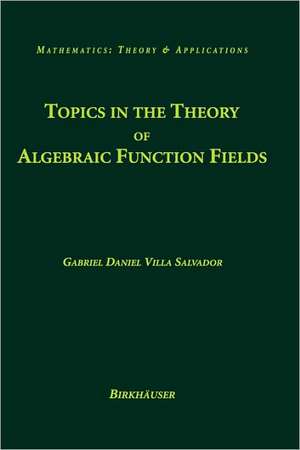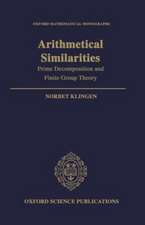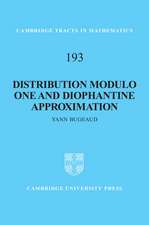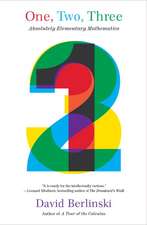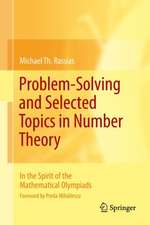Topics in the Theory of Algebraic Function Fields: Mathematics: Theory & Applications
Autor Gabriel Daniel Villa Salvadoren Limba Engleză Hardback – 11 iul 2006
The only prerequisites are a basic knowledge of field theory, complex analysis, and some commutative algebra. The book can serve as a text for a graduate course in number theory or an advanced graduate topics course. Alternatively, chapters 1-4 can serve as the base of an introductory undergraduate course for mathematics majors, while chapters 5-9 can support a second course for advanced undergraduates. Researchers interested in number theory, field theory, and their interactions will also find the work an excellent reference.
Preț: 747.83 lei
Preț vechi: 911.99 lei
-18% Nou
Puncte Express: 1122
Preț estimativ în valută:
143.09€ • 149.42$ • 118.16£
143.09€ • 149.42$ • 118.16£
Carte tipărită la comandă
Livrare economică 15-29 aprilie
Preluare comenzi: 021 569.72.76
Specificații
ISBN-13: 9780817644802
ISBN-10: 0817644806
Pagini: 652
Ilustrații: XVI, 652 p.
Dimensiuni: 155 x 235 x 35 mm
Greutate: 1.03 kg
Ediția:2006
Editura: Birkhäuser Boston
Colecția Birkhäuser
Seria Mathematics: Theory & Applications
Locul publicării:Boston, MA, United States
ISBN-10: 0817644806
Pagini: 652
Ilustrații: XVI, 652 p.
Dimensiuni: 155 x 235 x 35 mm
Greutate: 1.03 kg
Ediția:2006
Editura: Birkhäuser Boston
Colecția Birkhäuser
Seria Mathematics: Theory & Applications
Locul publicării:Boston, MA, United States
Public țintă
ResearchCuprins
Algebraic and Numerical Antecedents.- Algebraic Function Fields of One Variable.- The Riemann-Roch Theorem.- Examples.- Extensions and Galois Theory.- Congruence Function Fields.- The Riemann Hypothesis.- Constant and Separable Extensions.- The Riemann-Hurwitz Formula.- Cryptography and Function Fields.- to Class Field Theory.- Cyclotomic Function Fields.- Drinfeld Modules.- Automorphisms and Galois Theory.
Recenzii
From the reviews:
"Gabriel Daniel Villa Salvador's book Topics in the Theory of Algebraic Function Fields was recently translated into English and published by Birkhäuser (the original version was published in Mexico in 2003). In the book, Salvador covers a large amount of material at a wide range of levels of difficulty, and as such his book could be used in a wide variety of settings.... The entire book is very well written and Villa Salvador includes many examples to both illustrate and motive the theory being presented. There are also a handful of exercises in each chapter.... The study of function fields is a beautiful area of mathematics which seems to be ever-increasing in importance, and this book is a wonderfully well-written introduction to the area." —MAA Reviews
"The book is intended as a self-contained introduction to the theory of algebraic function fields in one variable. It is based on the original Spanish edition, published in 2003. … It also includes exercises and an appendix on group cohomology. Most of the topics treated are fairly standard for textbooks on algebraic function fields. … The book contains numerous exercises." (Manfred Lochter, Mathematical Reviews, Issue, 2007 i)
“This book is the algebraic-arithmetic approach studying function fields as part of the algebraic theory of numbers. … The text is written in a very lucid and comprehensive style suitable for a first-year graduate course on algebraic number theory. … It is a beautiful book showing how different algebraic theories fit together creating the huge building of algebraic function fields.” (H. Mitsch, Monatshefte für Mathematik, Vol. 153 (4), April, 2008)
"Gabriel Daniel Villa Salvador's book Topics in the Theory of Algebraic Function Fields was recently translated into English and published by Birkhäuser (the original version was published in Mexico in 2003). In the book, Salvador covers a large amount of material at a wide range of levels of difficulty, and as such his book could be used in a wide variety of settings.... The entire book is very well written and Villa Salvador includes many examples to both illustrate and motive the theory being presented. There are also a handful of exercises in each chapter.... The study of function fields is a beautiful area of mathematics which seems to be ever-increasing in importance, and this book is a wonderfully well-written introduction to the area." —MAA Reviews
"The book is intended as a self-contained introduction to the theory of algebraic function fields in one variable. It is based on the original Spanish edition, published in 2003. … It also includes exercises and an appendix on group cohomology. Most of the topics treated are fairly standard for textbooks on algebraic function fields. … The book contains numerous exercises." (Manfred Lochter, Mathematical Reviews, Issue, 2007 i)
“This book is the algebraic-arithmetic approach studying function fields as part of the algebraic theory of numbers. … The text is written in a very lucid and comprehensive style suitable for a first-year graduate course on algebraic number theory. … It is a beautiful book showing how different algebraic theories fit together creating the huge building of algebraic function fields.” (H. Mitsch, Monatshefte für Mathematik, Vol. 153 (4), April, 2008)
Textul de pe ultima copertă
The fields of algebraic functions of one variable appear in several areas of mathematics: complex analysis, algebraic geometry, and number theory. This text adopts the latter perspective by applying an arithmetic-algebraic viewpoint to the study of function fields as part of the algebraic theory of numbers, where a function field of one variable is the analogue of a finite extension of Q, the field of rational numbers. The author does not ignore the geometric-analytic aspects of function fields, but leaves an in-depth examination from this perspective to others.
Key topics and features: * Contains an introductory chapter on algebraic and numerical antecedents, including transcendental extensions of fields, absolute values on Q, and Riemann surfaces
* Focuses on the Riemann–Roch theorem, covering divisors, adeles or repartitions, Weil differentials, class partitions, and more
* Includes chapters on extensions, automorphisms and Galois theory, congruence function fields, the Riemann Hypothesis, the Riemann–Hurwitz Formula, applications of function fields to cryptography, class field theory, cyclotomic function fields, and Drinfeld modules
* Explains both the similarities and fundamental differences between function fields and number fields
* Includes many exercises and examples to enhance understanding and motivate further study
The only prerequisites are a basic knowledge of field theory, complex analysis, and some commutative algebra. The book can serve as a text for a graduate course in number theory or an advanced graduate topics course. Alternatively, chapters 1-4 can serve as the base of an introductory undergraduate course for mathematics majors, while chapters 5-9 can support a second course for advanced undergraduates. Researchers interested in number theory, field theory, and their interactions will also find the work an excellent reference.
Key topics and features: * Contains an introductory chapter on algebraic and numerical antecedents, including transcendental extensions of fields, absolute values on Q, and Riemann surfaces
* Focuses on the Riemann–Roch theorem, covering divisors, adeles or repartitions, Weil differentials, class partitions, and more
* Includes chapters on extensions, automorphisms and Galois theory, congruence function fields, the Riemann Hypothesis, the Riemann–Hurwitz Formula, applications of function fields to cryptography, class field theory, cyclotomic function fields, and Drinfeld modules
* Explains both the similarities and fundamental differences between function fields and number fields
* Includes many exercises and examples to enhance understanding and motivate further study
The only prerequisites are a basic knowledge of field theory, complex analysis, and some commutative algebra. The book can serve as a text for a graduate course in number theory or an advanced graduate topics course. Alternatively, chapters 1-4 can serve as the base of an introductory undergraduate course for mathematics majors, while chapters 5-9 can support a second course for advanced undergraduates. Researchers interested in number theory, field theory, and their interactions will also find the work an excellent reference.
Caracteristici
Adopts a number-theoretic perspective by applying an arithmetic-algebraic viewpoint to the study of function fields as part of the algebraic theory of numbers Explains both the similarities and fundamental differences between function fields and number fields Includes many exercises and examples to enhance understanding and motivate further study Can serve as a text for an advanced undergraduate or graduate course; also an excellent reference
